.jpeg)
Introduction
Are you weighing the pros and cons of owning a mobile kitchen versus renting or leasing one? It’s a decision that can significantly affect your cash flow, operations, and long-term ROI. Whether you're running a resort undergoing kitchen renovations or managing a seasonal culinary event, selecting the right financial model is critical.
The demand for mobile kitchens is growing, especially in foodservice, healthcare, and emergency response sectors. The global mobile food services market is projected to reach $29.7 billion by 2028, driven by flexibility and rapid deployment needs.
This article breaks down the key differences between buying, renting, and leasing mobile kitchens, offering detailed insights on cost, flexibility, and performance. Learn how each model stacks up and why Mobile Culinaire's premium rental service may be the most strategic choice for your hospitality business.
What Is a Mobile Kitchen?
A mobile kitchen is a self-contained, fully functional kitchen unit, typically built inside a trailer, container, or vehicle. It has all essential equipment, which includes ovens, refrigeration, prep tables, sinks, and ventilation, meeting health codes and safety regulations.
Industries using mobile kitchens include:
- Emergency response services
- Resorts and hotels
- Country clubs
- Schools and universities
- Military operations
- Events and festivals
- Film and television productions
For more information, read our in-depth article introducing you to mobile kitchen trailers.
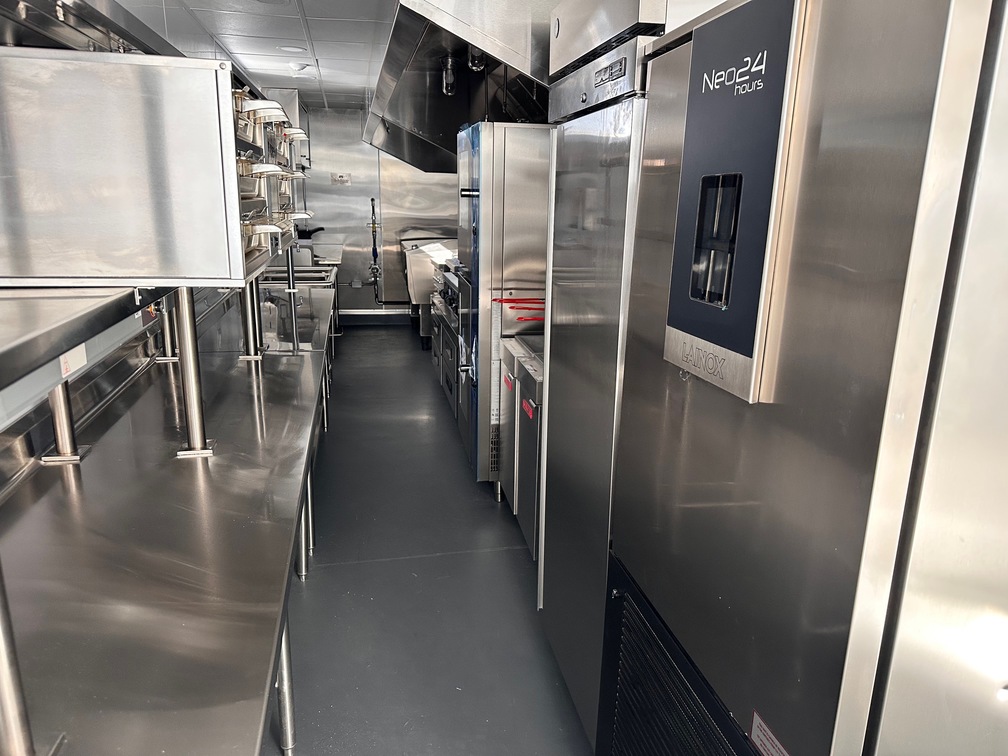
Buying a Mobile Kitchen
Pros
Long-term Ownership
Purchasing a mobile kitchen gives you complete ownership. It becomes a long-term asset on your balance sheet, contributing to your company's equity over time.
Customization
You can tailor every detail of the kitchen (equipment, layout, finishes) to your exact operational needs. This flexibility can improve workflow and efficiency.
No Usage Restrictions
With ownership, there are no limitations on how much or how often you use the kitchen. You can also modify it as your business evolves.
Cons
High Upfront Cost
While basic food trailers may range from $15,000 to $50,000, fully outfitted commercial mobile kitchens typically cost between $150,000 and $500,000 depending on size and customization.
Maintenance and Repairs
As the owner, you're responsible for all repairs, routine maintenance, and potential upgrades, which adds ongoing costs and time.
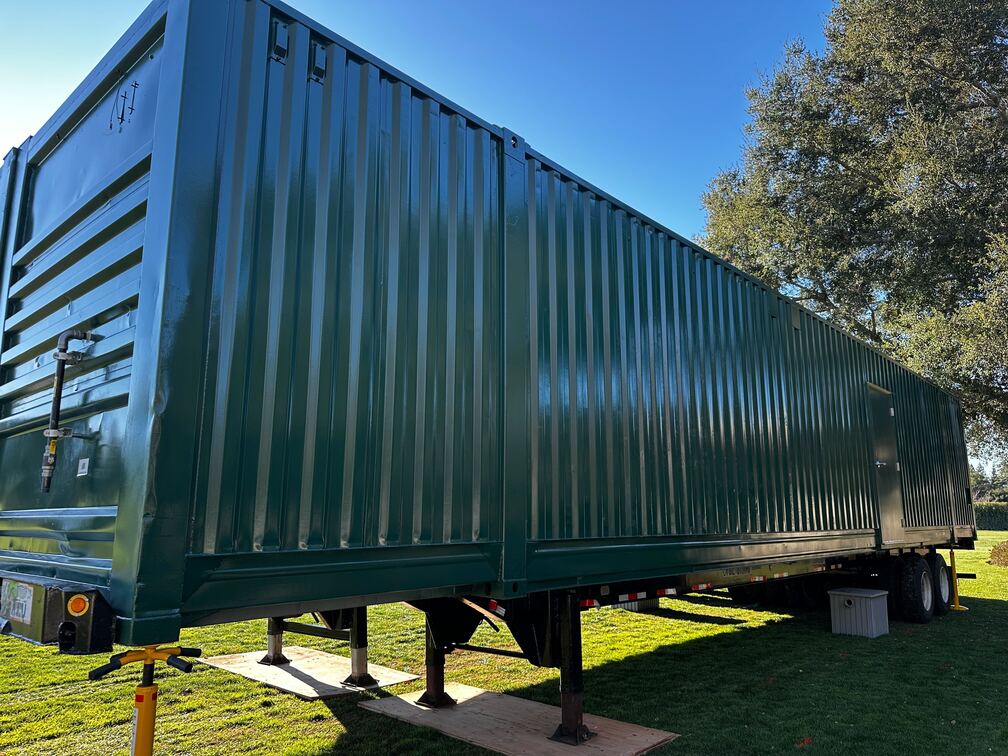
Renting a Mobile Kitchen
Pros
Lower Capital Investment
Rentals are ideal for businesses that need a mobile kitchen without a large upfront expense.
Speed and Flexibility
Rental units are usually ready to deploy with minimal lead time. This makes them a great option when you need a kitchen fast for a short-term project. They are especially suitable for kitchen renovations that last less than 18 months.
No Maintenance Worries
Most rental agreements include maintenance and repairs. This means less hassle and fewer surprise costs during your rental period.
Cons
Recurring Expense
While rentals are affordable up front, they can become costly if used for extended periods. Over time, monthly fees may exceed the cost of ownership.
Limited Customization
Rental units come pre-designed. This means you’ll have to work within the constraints of the existing layout and equipment.
Availability Risks
During busy seasons, demand spikes. You may face limited availability or need to settle for a less-than-ideal configuration.
.jpeg)
Leasing a Mobile Kitchen
Pros
Spread Out Payments
Leasing allows you to avoid large upfront costs. Instead, you pay in manageable installments, which can ease pressure on your cash flow.
Option to Own
Many lease agreements include a purchase option at the end. This gives you the flexibility to own the kitchen after testing it over time.
Newer Equipment
Leased units are often newer and more efficient. You’re more likely to get modern appliances and up-to-date features without paying full price.
Cons
Contractual Commitments
Lease terms usually last from 12 to 60 months. You’re locked into a contract, which may be restrictive if your needs change.
Higher Long-Term Cost
Though monthly payments are lower, leasing can cost more than buying in the long run, especially if you lease for several years.
.jpeg)
Financial Models of Mobile Kitchens Compared
Cost Comparison of Each Option
- Buying a mobile kitchen involves a significant upfront investment, often between $150,000 and $500,000 depending on size and specifications. You can acquire used food trailers for $5,000 to $40,000, offering a more budget-friendly option.
- Renting costs can range from $5,000 to $25,000/month. This is ideal for short-term use without capital expenditure.
- Leasing typically spans 1-3 years with lower upfront costs than buying. Monthly payments range from $3,000 to $15,000, offering a middle ground.
Note: The mobile kitchen sector is not just expanding, it’s optimizing how businesses launch or adapt foodservice operations. Startups using mobile kitchens have reported up to 34% savings in upfront capital compared to traditional restaurants, making them an increasingly strategic alternative.
Cash Flow Considerations and Tax Benefits
- Renting offers immediate cost predictability and can be deducted as an operational expense.
- Leasing may qualify for Section 179 tax deductions depending on structure.
- Buying enables asset depreciation but can strain initial cash flow.
Operational Impacts of Mobile Kitchen Models
Flexibility and Scalability
Rental and lease models allow easy upscaling or downsizing based on operational demand. Buying offers less flexibility without resale or reinvestment.
Setup and Deployment Speed
Mobile kitchen solutions ensure rapid setup in critical situations. Units can be functional within hours, providing essential support during emergencies or large-scale events. Renting from a premium provider like Mobile Culinaire ensures rapid deployment (1-2 weeks) with pre-installed utilities. Buying or custom-leasing typically requires longer lead times for fabrication and permitting.
Maintenance and Upkeep Responsibilities
With rentals, the provider usually covers maintenance and compliance updates. Owners must handle all upkeep, while lease terms vary by agreement.
%2520(1).jpeg)
Factors to Consider Before Deciding the Right Mobile Kitchen Trailer
Duration of Use
Start by evaluating how long you’ll need the mobile kitchen. Short-term projects, such as festivals or temporary facility closures, may justify renting. Long-term or ongoing operations typically benefit from leasing or buying, which offer better value over time.
Budget and Financing
Your available capital plays a major role in your decision. If cash flow is limited, renting or leasing can spread out expenses. However, if you have the resources to invest upfront, buying may provide greater long-term savings and equity.
Customization Needs
Think about how much flexibility you need in the kitchen’s design. Rentals usually come with a standard layout, while leasing may allow moderate customization. If your operation requires specific equipment or a tailored workflow, purchasing a custom unit might be the best option.
Permits and Compliance
Each location has its own health and safety regulations. Make sure your mobile kitchen (rented, leased, or purchased) meets all local codes. Some providers, like Mobile Culinaire, offer code-compliant units and support with permitting, saving you time and stress.
Use Case Examples of Commercial Mobile Kitchens
When Renting Makes Sense
A luxury hotel is undergoing a full kitchen renovation expected to last six months during the off-season. To maintain food service for guests and staff, the hotel rents a mobile kitchen that can be delivered, installed, and operational within a week, minimizing disruption and avoiding lost revenue.
When Leasing Makes Sense
A regional university is renovating all campus dining facilities over a two-year period. Rather than build temporary kitchens at each location, the school leases three mobile kitchens on a rotating basis, moving them from site to site as construction progresses.
When Buying Makes Sense
A disaster response nonprofit buys a highly customized mobile kitchen to support their mission. Designed for rugged conditions and tailored to their workflow, the kitchen becomes a core part of their operations, ready to deploy at a moment’s notice.
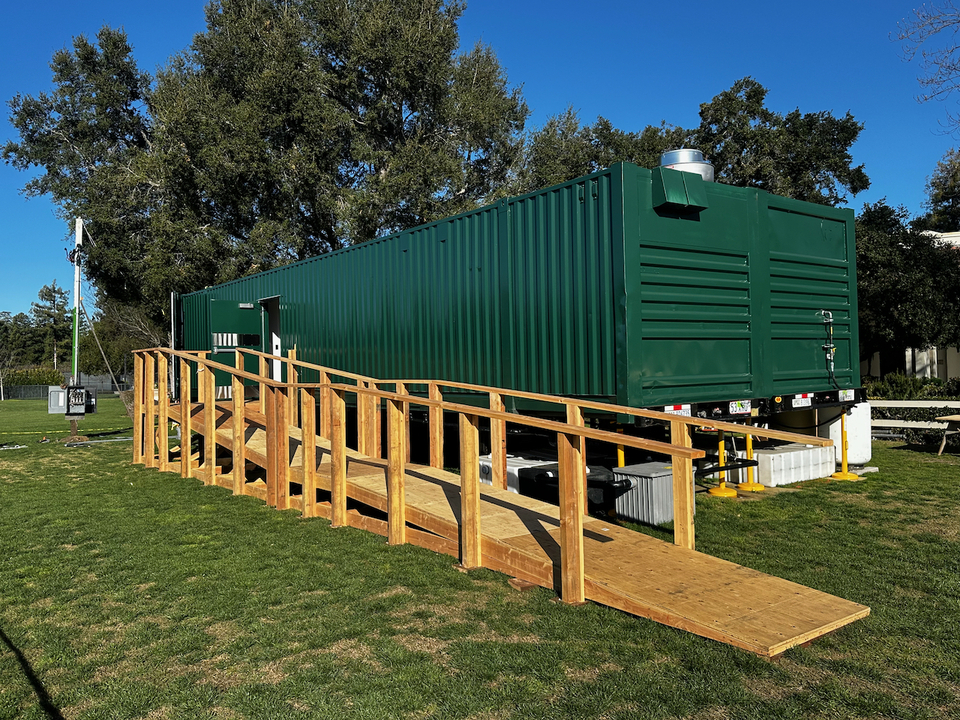
The Mobile Culinaire Advantage
Mobile Culinaire is not just a rental service provider; we're builders, specialists, and partners in your success. Every mobile kitchen trailer is engineered and manufactured in-house, allowing us to uphold unmatched standards of quality, durability, and field performance. With over 400 units produced, we maintain full control over the production process to ensure every kitchen performs like a permanent one.
Our expertise goes beyond hardware, we deeply understand the regulations, fire codes, and spatial logistics that govern mobile kitchens. This ensures compliance is seamless and that you stay focused on culinary excellence. And when it comes to experience, our process is built around you. From your first inquiry to installation, we manage every step with clarity and precision, so your team can concentrate on service, not setup.
Conclusion: Which Mobile Kitchen Option Is Best for You?
Your choice between buying, renting, or leasing depends on your business model, timeline, and capital strategy. For most hospitality operations managing renovations or temporary expansions, renting a high-performance mobile kitchen trailer from Mobile Culinaire provides the best combination of reliability, cost efficiency, and flexibility.
Contact our team today to explore the best solution for your business.
People Also Ask (FAQ)
Should I rent, lease, or buy a mobile kitchen for a renovation?
If your renovation lasts less than 18 months, renting provides the best short-term value with minimal setup time. Leasing fits 1–3 year projects, while buying is only ideal for long-term or permanent use.
How do mobile kitchen costs compare across financial models?
Renting involves predictable monthly fees; leasing offers lower upfront costs with mid-term commitments; buying requires substantial capital but yields long-term value for continuous operations.
How much does it cost to rent a mobile kitchen trailer?
Rental prices range from $5,000 to $25,000 per month based on size, configuration, and location.
Testimonial
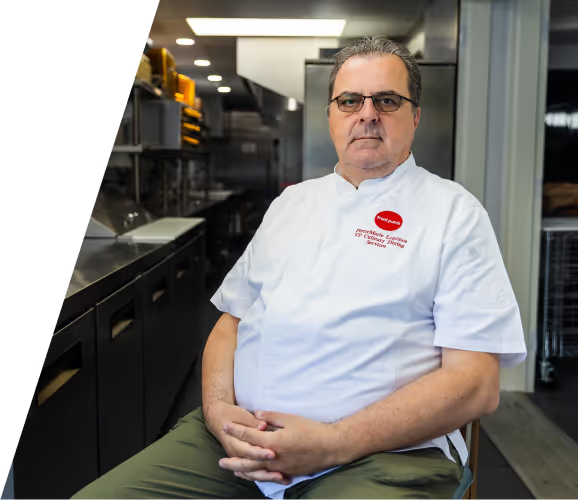
"What is standing out when you look at the mobile kitchen operation is the efficiency that we can really achieve because it's built for that."
Tell us about your kitchen needs and request a quote.
.png)
Turnkey mobile kitchen
.png)
Proudly made in-house in the USA
.png)
Commercial grade kitchen equipment
.png)
Code-compliant
Trusted by Industry Leaders



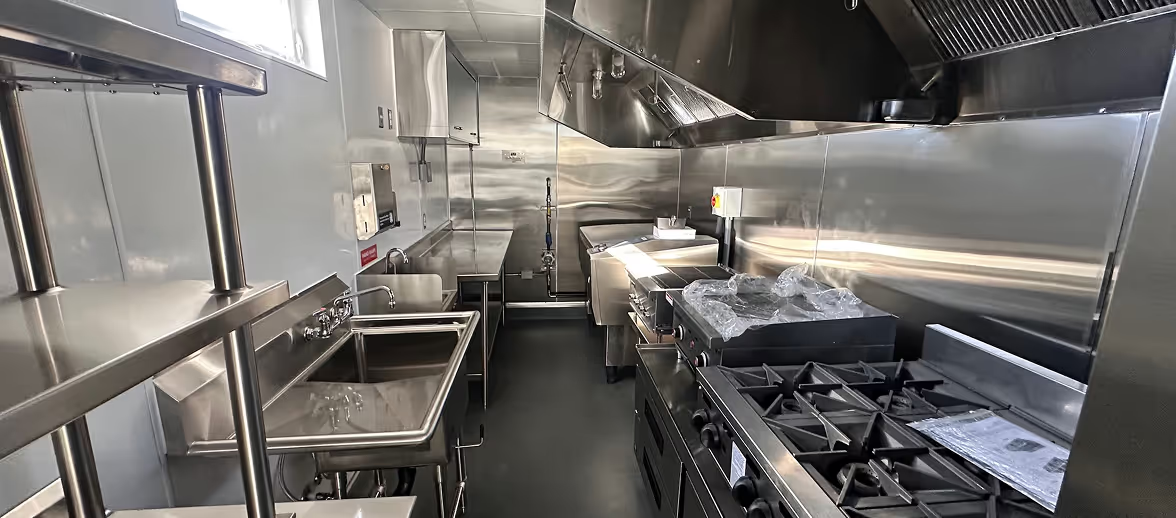
.gif)

%20(1).avif)
%20(1).avif)
%20(1).avif)